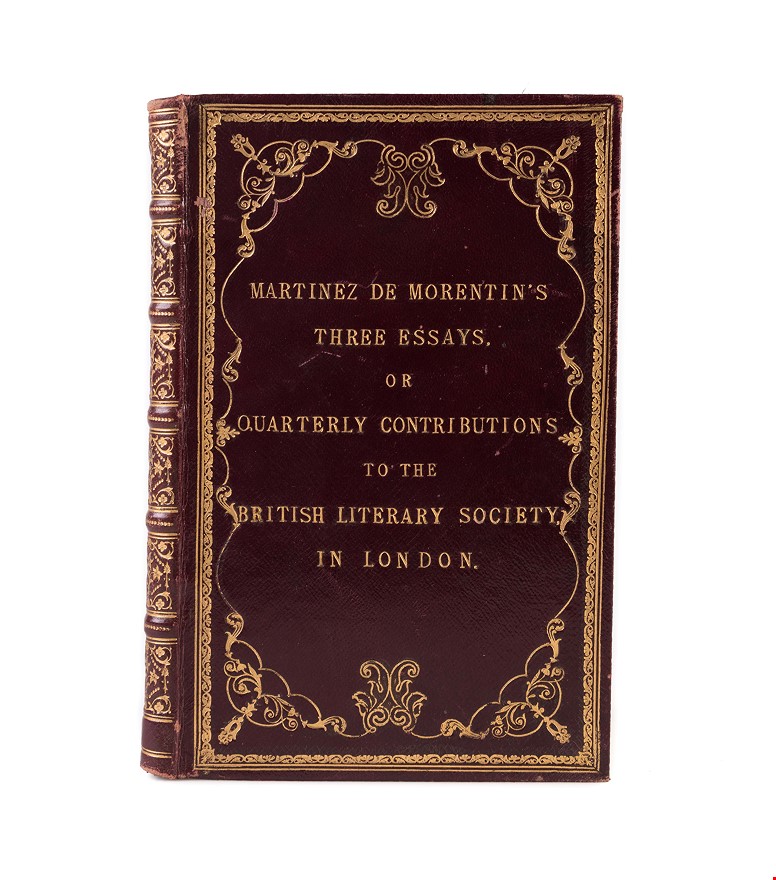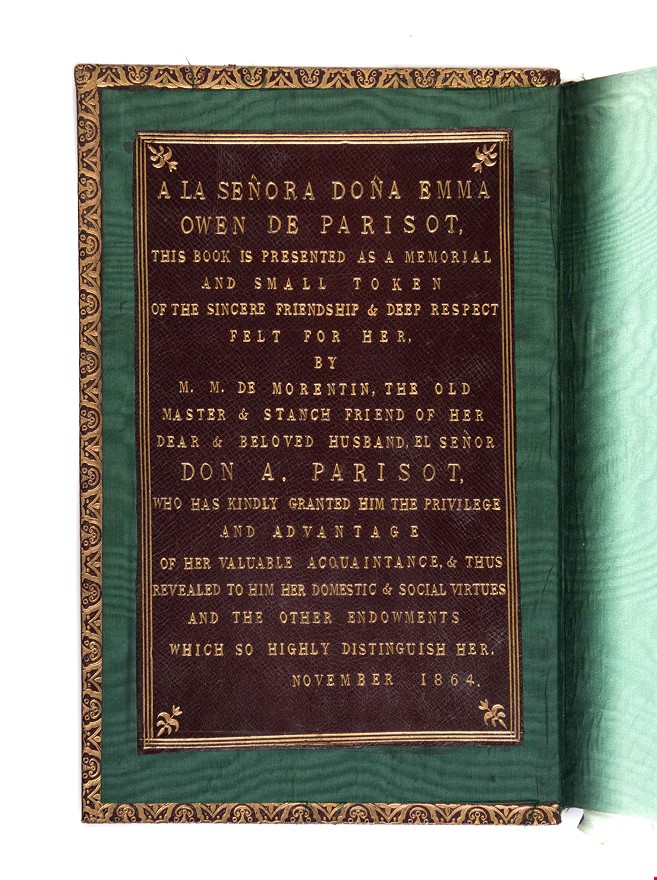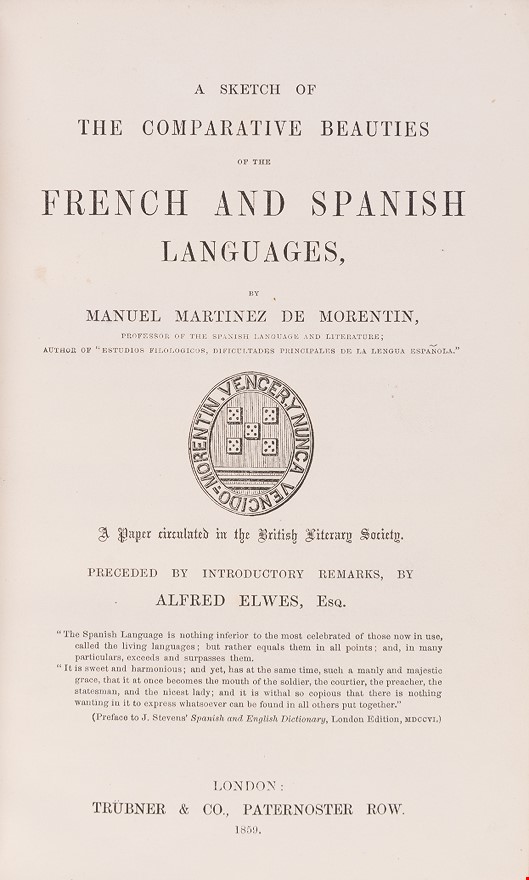A sketch of the comparative beauties of the French and Spanish languages... Preceded by introductory remarks by Alfred Elwes, Esq.37, [3(blank)]p., family coat of arms on title-page, London: Trübner & Co., 1859.Bound with:IBID. A sketch of the comparative beauties of the French and Spanish languages. Second and concluding part, being an answer to the Press. 60, [4 (Opinions of the Press)]p.,family coat of arms on title-page, London: Trübner & Co., 1860.Bound with:IBID. Rulers and Peoples; or thoughts upon government and constitutional freedom 50, [2]p.,family coat of arms on title-page, last leaf a blank, London: Trübner & Co., 1861. 3 works in 1 volume
MARTINEZ DE MORENTIN Manuel
£750.00
Please contact us in advance if you would like to view this book at our Curzon Street shop.
8vo (205 x 130mm.) contemporary Burgundy morocco, elaborately decorated in gilt with a central lettering panel enclosed by borders of simple rules, roll tools, elaborate corner pieces and swags, spine decorated in six panels, extensive inscription lettered in gilt on a large morocco label on the front free endpaper, all endpapers, including a pair between each of the three volumes, in watered silk, green silk marker
A remarkable and eccentric 'Gesamtkunstwerk' by the author.
In his 'Introductory Remarks' to the first work, Alfred Elwes (1818-99), 'author of various works on Philology and Belles Lettres' (including some books for boys) informs us that the author is 'a soldier, and a scholar' and we know from other sources that he claims to have taught Spanish widely in England, the USA, France and Germany. In what seems to be his first publication in London published in 1832 (Palau lists nothing under his name) Martinez de Morantin describes himself as 'Spanish commander of the column of Rifles belonging to the district of Tudela, in the province of Navarra in the years 1822 & 1823, who is now a refugee in England'. This must mean that he had fought in the royalist war. From the tone of the views expressed in the third work in this collection, he would not have fought on the repressive royalist side and he became therefore a Spanish exile in London, remaining here for the rest of his life. From his advertisement we know that he lived in 1860 at 3, St. George's Terrace. Lonsdale Square, Islington, and from the dedication we know that A. Parisot had been a pupil of Martinez de Morentin. The last of his various works was published in Spanish in London in 1864, a treatise on hygiene (copies in BL and Bodley) and the letter to Emma Owen Parisot (see below) is dated 24 November 1864.
The first work is written largely in response to a work by Antoine Rivarol (1754-1801) who in 1784 in Berlin published De l'universalité de la langue française, a pamphlet which had won the prize offered by the Academy of Berlin for an essay on the theme 'Qu'est-ce qui a rendu la langue française universelle?'. Rivarol had eloquently vaunted the supremacy of French and had further stated 'que la magnificence de la langue espagnole cachait une pauvreté réelle'. This typically French attitude our author in true military fashion attacks. This work was published in June 1859. In the second philological tract which follows there is much comparative discussion of individual aspects of Spanish vocabulary, and examples of translation of two passages of Tacitus are given into Italian, French, and Spanish, as well as comparison of verses by Metastasio, J.J. Rousseau, and [Juan] Melendez [Valdés].
The third work by our author is political in nature or as he calls it on p. 4 'this little Manual of Liberty' and is divided into three parts of which part three is about Spain, where (for example) the poor performance of Spain in the way of popular education is unfavourably contrasted with that of Prussia, and England is viewed as 'the freest country in the World' (p. 32) where the king is under the law 'quia lex facit regem', and where the patrician body 'is the most enlightened in the world' whereas Spain's record is judged to be poor.
PROVENANCE: The three slim works were bound together for presentation: to transcribe the remarkable front endpaper (for the sake of legibility we transpose from upper case throughout) "A la Señora Doña Emma Owen de Parisot. This book is presented as a memorial and small token of the sincere friendship & deep respect felt for her, by M.M. de Morentin, the old master & stanch[sic] friend of her dear & beloved husband, El Señor Don A. Parisot, who has kindly granted him the privilege and advantage of her valuable acquaintance, & thus revealed to him her domestic & social virtues and the other endowments which so highly distinguish her. November 1864." This extraordinary encomium continues in an autograph letter of presentation of the book "a poor offering indeed! yet, humble as it is - still a Book". It may not be incidental that the letter is written on the blank leaf of an elaborately printed advertisement for his lessons which itself is printed by C. Wood 'English and Spanish printing office, 38 Gracechurch Street, London'.
To find such a fine presentation copy of these three rare works is extraordinary. Only the first is entered in COPAC or the BL catalogue. No work by the author seems to be at Harvard or Yale and there would not appear to be any copies in Europe.
Stock Code: 231177






